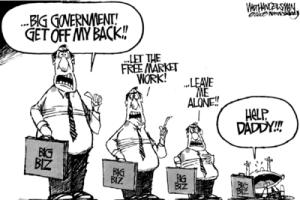- MENU
- HOME
- SEARCH
- WORLD
- MAIN
- AFRICA
- ASIA
- BALKANS
- EUROPE
- LATIN AMERICA
- MIDDLE EAST
- United Kingdom
- United States
- Argentina
- Australia
- Austria
- Benelux
- Brazil
- Canada
- China
- France
- Germany
- Greece
- Hungary
- India
- Indonesia
- Ireland
- Israel
- Italy
- Japan
- Korea
- Mexico
- New Zealand
- Pakistan
- Philippines
- Poland
- Russia
- South Africa
- Spain
- Taiwan
- Turkey
- USA
- BUSINESS
- WEALTH
- STOCKS
- TECH
- HEALTH
- LIFESTYLE
- ENTERTAINMENT
- SPORTS
- RSS
- iHaveNet.com
New Antitrust Rules Have Big, Powerful Companies Sweating
by by Tamara Lytle

The Obama administration has swept away policy after policy from the Bush administration, and the top antitrust regulator, Assistant Attorney General Christine Varney, made it clear in her first speech this week that she's coming in with a very big broom.
Varney repudiated the Bush administration's more laissez-faire approach to monopoly cases in a forceful speech to a liberal think tank and then in another one to the U.S. Chamber of Commerce. A report issued last year by the Bush administration on monopoly regulation is no longer government policy, she warned judges, lawyers, and companies. "As antitrust enforcers, we cannot sit on the sidelines any longer, both in terms of enforcing the antitrust laws and contribution to sound competition policy as part of our nation's economic strategy," she said in her speech.
Antitrust regulation is designed to protect consumers from a concentration of power in a market that leads to higher prices, lower quality, and less innovation. But how to do that opens a philosophical divide over whether aggressive regulation does more harm than good in the marketplace.
Varney's announcement will have big companies with large market shares sweating. So will an eye-popping $1.45 billion fine imposed Wednesday on computer chip maker Intel Corp. by the European Commission. The European Union's regulatory body found that Intel had given customers incentives to keep them from buying from its competitor, Advanced Micro Devices.
Antitrust experts predict Varney will set her sights on high-tech companies as she steps up antitrust enforcement, as well as health, pharmaceutical, telecommunications, food, and agriculture firms. High-tech firms in particular are ripe for monopoly violations because they can quickly gobble up large chunks of a market if they are first to the table. And as a former Netscape attorney, Varney won't be scared off by the geekspeak that comes with the tech world, says University of Chicago law professor Randy Picker, who teaches antitrust. But Varney says no area is off limits. "I'm not afraid to roll up my sleeves and learn any industry," she says.
Varney's comments sent a clear message that she wants to return some of the balance of power in monopoly regulation to the United States. During the past eight years, companies bypassed the Bush Justice Department, instead taking their cases to the European Commission and the other 100 international regulatory bodies. Varney says she hopes her speeches will prompt corporate attorneys to press companies to "behave well," and she invited victims to come to the Justice Department with their complaints. And the Federal Trade Commission, which has an investigation of Intel open, now will probably move ahead with the case.
Antitrust cases are notoriously complicated and can take a year or more to bring to trial, so Varney's big talk may mean little action in the short term. And her predecessor in the Bush administration, Thomas Barnett, says it "remains to be seen how far they can go," since the Supreme Court is more in sync with his approach. "It's easy to give a speech. It's harder to bring cases and win them," says Steven Salop, a Georgetown professor of economics and law who specializes in antitrust.
Even if Salop is right, powerful businesses can't help but worry.
WORLD | AFRICA | ASIA | EUROPE | LATIN AMERICA | MIDDLE EAST | UNITED STATES | ECONOMICS | EDUCATION | ENVIRONMENT | FOREIGN POLICY | POLITICS
© Tribune Media Services